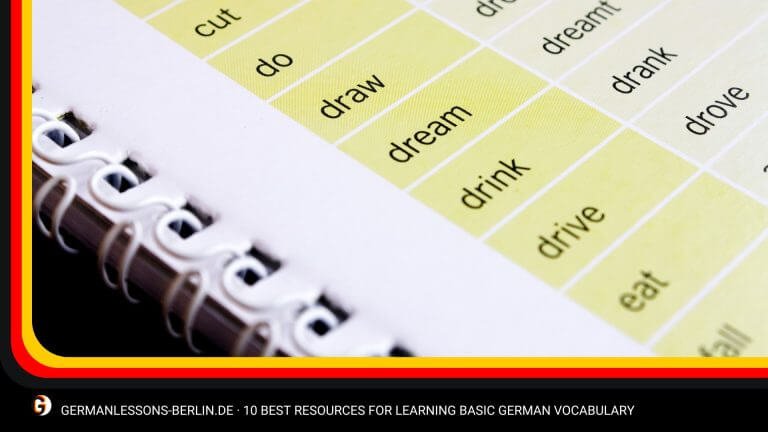Learning a new language can be intimidating, especially when it comes to German. With its complex grammar and long words, many feel overwhelmed at the thought of even attempting to learn this foreign tongue. But what if you could do it for free? That’s right- you don’t have to break the bank or sacrifice your freedom in order to learn a new language!
In this ultimate guide on how to learn German for free, we will cover all of the necessary steps that are required to master this beautiful yet challenging language. From identifying resources available online to using native speakers as teachers – we will show you exactly where and how you can begin learning German without having to spend a dime!
Whether your goal is just ‘getting by’ while vacationing in Germany, or becoming fluent enough to hold an entire conversation with ease – our comprehensive guide has got you covered! So let’s get started and unlock the door that leads towards fluency in no time!
Table of Contents
Overview Of the German Language
Learning German is like opening the door to a new world. Its rich history and culture can be explored through its language, which has been used by millions of people since it began in the 8th century. This article provides an overview of the German language, from its origins to its current status as one of the most widely spoken languages in Europe.
The German language belongs to the Indo-European family of languages and is divided into three main dialects: High German, Middle German, and Low German. All three share a common vocabulary, grammar structure, and writing system but differ in pronunciation and spelling. It is estimated that there are over 90 million native speakers worldwide who use it for communication both inside Germany and outside its borders.
German has had a huge influence on other European languages throughout history. Many words borrowed from German have become part of English usage such as ‘kindergarten’ or ‘hamburger’. Even today many scientific terms come from this language, making it vital for those studying sciences or engineering at university level. With such far-reaching importance, understanding the basics of this language presents countless benefits. Looking ahead to our next section we will discuss these further.
Benefits Of Learning German
Learning German comes with a wealth of benefits that can help you in many different aspects of your life. Here are just some of the advantages to understanding this language:
- Expanding Your Job Prospects – Being bilingual is becoming increasingly more valuable within the workforce, and having a working knowledge of German could give you an edge over other applicants when searching for jobs. Additionally, being able to speak German may open up opportunities in countries where it’s spoken; for example, if you’re looking into teaching English abroad or starting a business overseas.
- Interacting with More People – Knowing even a few words or phrases in another language can be incredibly helpful when visiting or living in Germany or any country where German is spoken. It will allow you to communicate with locals and make connections easier than ever before!
- Exploring Other Cultures – Learning about another culture through its native language gives insight into ways of thinking that would otherwise remain inaccessible. You’ll get to explore literature, films, music and so much more from these regions without feeling like an outsider.
Overall, learning German provides an opportunity to grow as both an individual and professional while opening doors to new experiences around the world! With all these exciting possibilities at hand, let’s move onto discovering essential vocabulary and grammar rules needed to begin speaking German fluently.
Essential Vocabulary And Grammar Rules
Learning German doesn’t have to be hard or expensive. To get started, it’s essential to understand the basic language structure and become familiar with the most common vocabulary words and phrases. When you start studying German nouns and verb conjugation, you’ll find that they are relatively simple compared to other languages. Once you know some of these basics, it will open up a whole new world of possibilities for expressing yourself in German.
It is also important to learn how to pronounce words correctly so as not to confuse native speakers. Start by focusing on basic phrases such as greetings, introductions, questions, and responses. Practicing pronunciation aloud will help you gain confidence when communicating with others in German. Pay attention to intonation patterns and accents for added emphasis on certain syllables or words. This can be difficult at first but practice makes perfect!
Finally, there are plenty of resources available online which provide helpful tips and guidelines for mastering grammar rules and improving your communication skills in German. These range from free tutorials covering key topics like sentence construction and verb conjugations, through audio recordings providing detailed explanations about specific expressions or idioms in the language. With enough dedication and effort anyone can make great progress towards becoming proficient in speaking German without spending a penny!
Resources For Learning German Online
Now that you understand the essential vocabulary and grammar rules of German, it’s time to look into resources for learning the language online. There are a variety of free options available to help you learn German without spending any money. From websites offering comprehensive courses in German to apps designed specifically for practicing your language skills, there’s no shortage of ways to get started with your journey towards speaking fluent German.
When it comes to finding resources for learning German online, one great place to start is YouTube. With thousands of videos dedicated to teaching various aspects of the language, from pronunciation tips to grammar lessons, YouTube offers an invaluable source of information on how best to learn German quickly and effectively. Additionally, many channels offer complete courses in German at no cost; all you need is a device with internet access and some patience!
Another great way to find free materials for studying German is through online forums such as Reddit or Quora. By joining these groups devoted exclusively to discussing the nuances of the language, users can connect with native speakers who are willing to answer their questions and give advice on learning techniques specific to each individual learner. On top of this, members have access to many useful links containing helpful exercises or audio recordings they can use while studying.
With so many incredible sources available at our fingertips today, there’s truly no excuse not getting started on your quest towards mastering the beautiful language known as German! The next step? Finding appropriate free apps for practicing what you’ve learned thus far – stay tuned!
Free Apps For Practicing German
Learning German for free is easier than ever with the help of apps. There’s a multitude of language learning applications available on both iOS and Android devices, giving you access to an incredible range of features that can help you practice your new skills. From flashcards to audio lessons, these apps make it easy to get started on your journey towards fluency.
One popular app is Duolingo, which offers a comprehensive set of exercises designed to help users learn the basics of grammar and vocabulary in a fun way. The interface makes it simple to track progress over time and see where improvements need to be made. It also includes helpful hints along the way so users have guidance as they go through each lesson. For those looking for more advanced material, there are several other options such as Busuu, Memrise, and Babbel which offer tailored content based on individual needs and preferences.
No matter what level you’re at or what type of learner you are, there’s sure to be an app out there that will fit your needs perfectly. With so many free resources available online today, all anyone has to do is choose one that works best for them and start practicing their German! To maximize learning potential, combining different methods such as listening practice with memorization techniques can yield great results. Now let’s take look at some strategies for remembering new words.
Strategies For Remembering New Words
Learning a new language can be like taking an exciting journey, and mastering German vocabulary is the first step of that adventure. To help you remember words better and make progress faster, here are a few strategies to get started with the right resources for learning German for free.
First, take advantage of online sites and apps offering free flashcards or other tools specifically designed to practice German vocabulary. Using mnemonics or funny stories can also be helpful in remembering new words more quickly. Additionally, look into digital options such as Duolingo and Quizlet which offer interactive activities featuring audio pronunciations to help deepen your understanding of German pronunciation rules.
Another great way to expand one’s knowledge of German is through reading books written in the language; this could include classic literature, children’s stories or even comics about everyday situations. For example, by reading something fun like Asterix & Obelix comic books you can learn how Germans talk while having some laughs along the way! Finally, try listening to podcasts created especially for learners of German as they explain grammar points and provide conversations in context between native speakers. By doing any combination of these activities on a regular basis, you will find yourself speaking German fluently soon enough! With all these resources available it should not be difficult to access native speakers who can help you practice conversations – so start exploring now!
Accessing Native Speakers To Practice Conversations
Getting the opportunity to practice German conversations with native speakers is an excellent way for language learners to take their skills up a notch. With access to free German speaking practice, you can improve your pronunciation and pick up on new words or phrases that may be unfamiliar. Plus, learning how to converse in another language will increase your confidence when communicating in German!
To get started, try searching online for available resources like websites that offer free German conversations with native speakers. Additionally, there are numerous apps and platforms where you can connect with others who also want to learn or practice the language. These tools are great because they allow users to search by country of origin so they can find someone whose dialect matches theirs. They also provide a convenient way for individuals from around the world to brush up on their conversational skills without having to leave home.
Another option would be participating in a German Language Exchange program. This type of setup allows students to meet virtually or in person with native speakers and exchange conversation topics as each party helps the other become more fluent in their respective languages. It’s an incredibly cost-effective way for learners at any skill level to gain valuable experience talking with people who speak naturally and know all the subtle nuances of Germany’s language.
With these options at hand, finding opportunities for productive German speaking practice has never been easier! Taking advantage of them will undoubtedly lead you down the path towards fluency – no matter if it’s something you’ve been dreaming of achieving since childhood or just recently decided was worth pursuing now.
Participating In German Language Exchanges
Nowadays, the internet has made it easier than ever to participate in language exchanges with native German speakers. A language exchange is a free and mutually beneficial relationship between two individuals who want to learn each other’s languages. By participating in an exchange, you can practice your conversational skills with someone who speaks both English and German.
To find a language exchange partner, start by searching online for “free German language exchanges” or “German conversation partners.” You might also try joining forums devoted to learning German where people are often looking for conversation partners. Additionally, there are several websites that facilitate this kind of connection – such as InterPals, Conversation Exchange, My Language Exchange, and Italki – which make finding a suitable partner easy. To increase your chances of finding a good match, put some effort into creating a comprehensive profile about yourself on these sites.
Although engaging in conversations with native speaker is the most effective way to improve your fluency and accuracy in speaking another language, it can be difficult at times when you don’t know all the words or grammar rules yet. For those moments when you need help understanding something quickly, take advantage of free online courses and tutorials available on YouTube and other platforms that offer tips from experienced teachers who have mastered the German language themselves!
Taking Advantage Of Free Online Courses And Tutorials
Using free online courses and tutorials is an excellent way to learn German for free. With so many resources available, you can quickly find the right course or tutorial that fits your learning style and budget. Plus, with a little research and dedication, you can easily master the language in no time!
| Free Resources | Learning Strategies | Online Courses |
| YouTube Tutorials | Dedication & Consistency | Duolingo |
| App-Based Tutoring | Practice & Repetition | Babbel |
| Open Culture Library | Assess Your Knowledge | Lingoda |
| Conversation Exchanges | Utilize Mnemonic Devices | Livelingo |
The best part about using these free online courses and tutorials is that they allow you to focus on specific areas of the language such as grammar rules, pronunciation, vocabulary building, etc. You can even practice conversational German with native speakers through conversation exchange websites like My Language Exchange or Lang 8. Additionally, there are several apps available which provide a mixture of audio lessons and interactive exercises to help reinforce what you’ve learned from online courses and tutorials.
These types of activities will not only help you gain confidence in speaking German but also give you helpful tips on effective learning strategies. By implementing them into your everyday routine, you’ll be able to improve your comprehension skills while having fun at the same time. It’s never too late to start learning German – taking advantage of all the free resources out there makes it easy to get started today!
Tips For Enhancing Your Learning Experience
Making the most of your free online German courses and tutorials requires more than simply following instructions. To really speed up your language learning, it’s important to take some extra steps toward enhancing your experience. Here are a few tips for improving your language skills while enjoying the freedom of learning online:
Start by creating an environment that is conducive to learning. Your surroundings should be organized, quiet and comfortable in order to maximize concentration levels. Having materials such as textbooks or worksheets within easy reach can also help you stay focused on the task at hand. Additionally, listening to music or podcasts in German may help reinforce what you have learned and improve understanding.
Next, break down large tasks into small, achievable goals so that each step feels less overwhelming. This strategy will help keep you motivated and allow you to track progress easily over time. It’s also helpful to use visual cues like flashcards when studying vocabulary words; this method has been proven effective for memorization purposes. Additionally, make sure that you set aside time each day dedicated solely to speaking and practicing with native speakers – the best way to learn any new language quickly!
Finally, find ways to make learning fun. Try playing games like Scrabble using only German words or create dialogues with friends who are also studying the language. These activities not only stimulate creativity but add a sense of enjoyment which helps foster a positive attitude towards learning something new. As long as you remain flexible and willing to try different approaches, mastering German won’t feel like a chore anymore – rather an enjoyable journey full of discovery!
Frequently Asked Questions
What Is The Best Way To Learn German Quickly?
Learning a language can seem like an impossible task, especially when time is limited. Isn’t it ironic that the best way to learn German quickly has been around for centuries? While there are many tips and tricks available out there on how to fast-track learning German, free German lessons have stood the test of time as one of the most effective strategies.
With so much information at our disposal, it can be difficult to determine which approach leads to the quickest results with regard to mastering German. Fortunately, free German lessons offer students access to an interactive space where they can practice their conversational skills in a safe and supportive environment. Not only do these online classes provide learners with new knowledge, but also encourage them by helping them develop self-confidence along the way.
Whether you’re looking for basic grammar instruction or want to explore more complex topics such as literature or culture studies, there’s no shortage of resources available online. From podcasts and YouTube videos to virtual classrooms and forums – all designed specifically with language learners in mind – accessing quality educational materials doesn’t have to cost anything. Furthermore, while some websites may require membership fees, many platforms allow users to use their content without any charge whatsoever!
So if you’re someone who craves freedom but needs guidance on your journey toward becoming fluent in German, then taking advantage of free courses should be your first step! With plenty of options readily available at your fingertips and endless opportunities awaiting you once you’ve completed each lesson – what better way could there possibly be than this?
How Can I Find Native German Speakers To Practice With?
Learning a language can be daunting, and German is no exception. If you want to learn the language quickly and effectively, then it’s important to practice with native speakers. But how do you find them?
Fortunately, there are plenty of ways to connect with native German speakers for free! From online forums and social media platforms to local events and clubs in your area – there are tons of options available. You just need to know which ones best suit your needs.
For example, if you’re looking for an informal way to practice your German language skills without committing too much time or money, consider joining an online forum dedicated specifically to learning German. Here, you can easily interact with other users who may be able to help you improve your understanding of the language through conversations or shared resources. Similarly, using social media platforms like Facebook or Instagram will allow you to reach out directly to people who speak German as their first language by searching hashtags such as #germanlanguagepractice or #connectwithgermanspeakers.
No matter what route you take when connecting with native speakers, don’t forget that taking advantage of all these avenues could be a great opportunity for not only improving your knowledge about the language but also gaining insight into its culture and traditions from those who live it every day!
Is There An Official Certification For German?
Are you wondering if there is an official certification for German language proficiency? Well, the answer is yes! With a formal certificate in hand, you can demonstrate your knowledge of the language and its various nuances.
Learning German isn’t just about memorizing vocabulary words or mastering grammar rules; it requires dedication and patience to achieve fluency. Fortunately, with the right resources at your fingertips, you can get certified in the language without spending any money. Here are some ways to access official German certifications:
– Take an online course that offers a certificate upon completion. Many websites, such as Duolingo and Babbel provide comprehensive courses that include quizzes, videos, and audio recordings to help users learn German from scratch. On successful completion of these courses, learners receive a certificate indicating their level of proficiency in the language.
– Participate in assessments such as Goethe Institute’s GDS test, which evaluates written and spoken skills for different levels of expertise. These tests give participants an idea of how well they understand German and how much more work needs to be done before they become competent speakers. The institute also provides certificates acknowledging one’s level of understanding after successfully completing each exam.
– Enroll in university programs where students study abroad during semester breaks or summer holidays while immersing themselves in local cultures and customs. Such experiences not only build confidence but also allow people to master the language quickly by interacting with native speakers on a daily basis. Most universities offer certificates upon completion that certify their students’ ability to use German both verbally and through writing tasks like essays or reports.
– Join virtual communities dedicated to learning foreign languages, such as LingoFever or HelloTalk where learners interact with other members who speak different languages across the globe—a great way to practice conversation skills while having fun along the way! Through this platform, users develop advanced listening comprehension abilities, which eventually leads them toward being proficient speakers of the target language they’re studying (in this case —German).
The journey towards becoming fluent in any language may seem daunting at first glance; however, taking small steps every day will soon take you closer to gaining full command over it. There are so many options available today when it comes to obtaining official certification for German, whether free or paid—the key lies in choosing what works best for you based on your current skill set & desired goals!
Are There Any Free German-Speaking Events I Can Attend?
Attending German-speaking events is a great way to learn the language for free. Not only can you gain knowledge and practice your skills, but it’s also an excellent opportunity to meet other people who are passionate about learning German. If you’re looking for free German-speaking events around you, here are some tips:
– Search online for local groups or organizations that host regular gatherings related to the German language and culture. You may find forums or social media pages dedicated to finding upcoming events in your area as well.
– Reach out to universities and libraries in your city – they often organize free courses and lectures related to the language. Sometimes there may even be a student group or club devoted entirely to teaching German!
– Use apps like Eventbrite or Meetup, which allow users to search for activities happening near them; this includes many free German-speaking events too!
Learning a new language doesn’t just expand our horizons intellectually, it also gives us freedom of choice. Attending German-speaking events will help boost your confidence when speaking the language, offer insights into its rich culture, as well as provide valuable networking opportunities with fellow learners and experts alike. Embrace these chances to discover more about yourself through engaging with others – no matter what level of proficiency you’re at. There’s always something new coming up, so don’t let another chance pass by!
Is There A Way To Test My German Language Proficiency?
Treading on the unfamiliar ground can be daunting, but testing your German language proficiency is an essential step to gauge how far you’ve come in your linguistic journey. If you want to measure your current German skills and get a better understanding of where you stand, there are plenty of ways to do so that won’t break the bank. From simple online tests to full-blown assessments of your German language abilities, this guide will give you all the information you need to take control of your progress.
First things first – it’s important to have realistic expectations about what kind of results a free test or assessment can offer. While these resources won’t tell you whether or not you’re fluent in German, they can help create a baseline from which you can build up and track your progress over time. Testing yourself also gives you a chance to identify areas for improvement and focus on those specific elements as part of your learning process.
The options available range from something as straightforward as an online quiz with multiple choice questions designed to assess basic grammar knowledge and vocabulary ability right through to international exams such as Goethe Institut’s well-known TestDaF (Test Deutsch Als Fremdsprache). These more comprehensive tests require some form of dedication, but they provide invaluable feedback by providing detailed insight into each area tested, along with tips and advice on how best to tackle them in future attempts.
As we continue our quest for fluency, taking regular stock of our capabilities is key for maintaining momentum and staying motivated – even if the road ahead looks long! By accessing both traditional methods like paper-based examinations or contemporary digital solutions like quizzes and video tutorials, it’s easy enough to put together an effective assessment plan tailored specifically towards measuring progress within the unique confines of our own personal situation.
Conclusion
Learning German doesn’t have to be expensive. With the right resources and some dedication, anyone can learn German for free! I understand that it may seem daunting at first, but with practice and patience, you’ll find yourself speaking confidently in no time. There are plenty of free German language courses available online as well as events where you can meet native speakers to practice your skills. Additionally, there are tests out there to help measure your proficiency level.
Overall, if you’re serious about learning a new language like German, then don’t let money stop you! Get creative when looking for resources and always remember that persistence pays off. You won’t regret the effort put into acquiring this valuable skill – I promise you that much!








